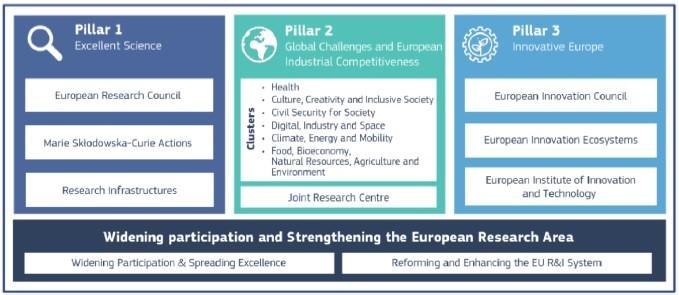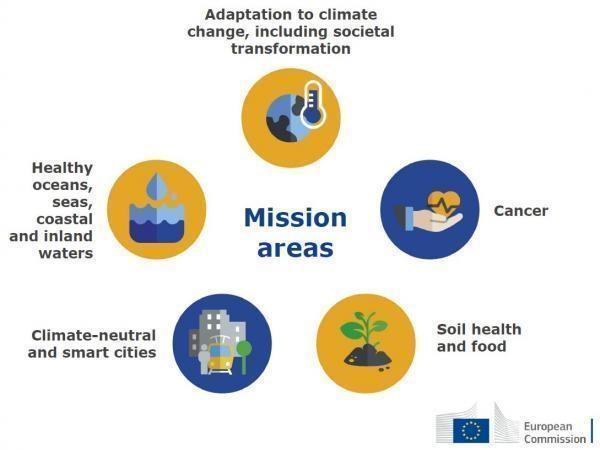
Research Newsletter - Issue 60: Spotlight
Horizon Europe
The new EU flagship funding programme for Research & Innovation will be launched in February 2021!
After a rollercoaster year of discussions and preparations, Horizon Europe (HE) - the main research and innovation funding programme from the European Union, will officially start in February 2021 and will run for the next 7 years until end of 2027. An agreement was reached late December 2020 on its total budget (€95.5 billion in current prices) which includes €5.4 billion from the NextGenerationEU, a temporary instrument designed to drive Europe’s recovery. The new programme will have a strong focus on tackling climate change (35% budgetary target); helping to achieve the UN Sustainable Development Goals (SDGs); and supporting the European area economic recovery.

A brief look at the programme’s structure above shows that it is not radically different to its predecessor, Horizon 2020:
Horizon Europe Pillar 1 - Excellent Science
Pillar 1 will continue to support frontier research projects designed and driven by researchers (“bottom-up”). It includes individual as well as collaborative opportunities, under the European Research Council Calls (ERC Starter, Consolidator and Advanced), Marie Skłodowska-Curie actions (MSCA) and the European Research Infrastructures (ERICs).
Horizon Europe Pillar 2 - Clusters
Pillar 2, Global Challenges and European Industrial Competitiveness, combines elements of H2020 Pillars 2 and 3 and supports research into societal as well as technological and industrial challenges. Large collaborative projects will be funded through calls clustered into 6 domain areas (as listed). Topics will be “top down” in their scope and expected impacts. Pillar 2 supports European Partnerships and Missions as an important part of its activities, and each cluster will contribute towards several of the SDGs.
Horizon Europe Pillar 3 - Innovative Europe
Pillar 3 is a new addition to the Programme and will focus on bringing research closer to market applications. It supports “researchers as innovators” through its three European Councils: The European Innovation Council (EIC), the European Innovation Ecosystems (EIE) and the European Institute of Innovation and Technology (EIT). DCU researchers applying for calls under this pillar should liaise with both RIS and DCU Invent support teams, looking at ways to capitalise on DCU’s applied research strengths.
Horizon Europe horizontal component
Finally, the 4th component “Widening participation and Strengthening the European Research Area”, will support participation from low R&I performing member states across the whole Programme, with circa 3% of the programme budget allocated for this purpose.
Missons

One of the main novelties of HE is the introduction of R&I Missions. Five Mission areas have been identified and each aims to be a portfolio of excellence-based and impact-driven R&I actions, combining a variety of actions to achieve specific and measurable goals within a set timeframe. These goals must have impact on society and policy-making through science and technology, and be relevant for a significant part of the EU population and to a wide range of European citizens.
Mission calls will fall mainly within Pillar 2, but might also benefit from actions carried out within the other Pillars, as well as complementary actions carried out under other Union funding programmes.
Brexit and UK participation on Horizon Europe
A post-Brexit agreement between the EU and the UK has been achieved, which ensures the UK’s eligibility for EU competitions under Horizon Europe. As a non-EU country, the UK will be able to join as an associate member, however this membership will not cover the whole programme and the full details of UK access to this and other EU funded research schemes are currently under negotiations. For the moment, it is known that the UK has decided not to participate on the ERASMUS+ exchange programme. It is also expected the UK will be excluded from the European Innovation Council’s grants and will also no longer participate in the EU’s Galileo satellite-navigation system.
Find out more
Horizon Europe Work Programmes are currently still in draft form but are available internally by request. For this or any further information on Horizon Europe funding opportunities please contact the EU Research Development Officer, Liana Drummond (liana.drummond@dcu.ie).
